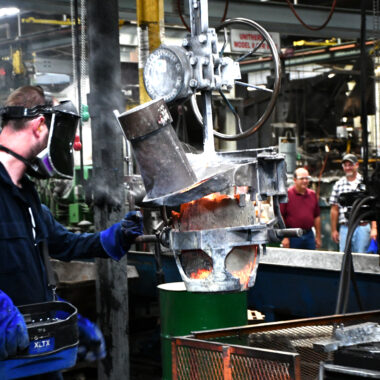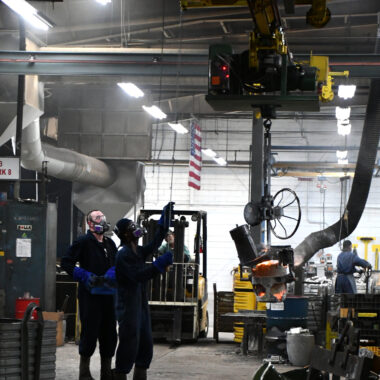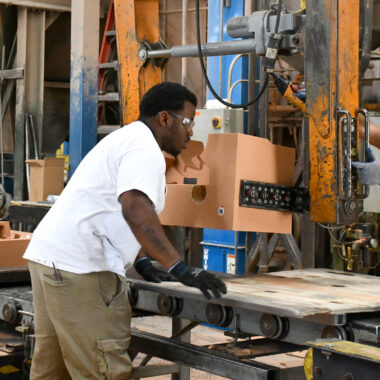Achieving Excellence in Light Weight Aluminum Casting: Crucial Idea
In the world of aluminum casting, accuracy and top quality are critical (casting aluminum illinois). The procedure of changing liquified light weight aluminum right into elaborate and durable components calls for a meticulous method at every phase. From meticulously picking the best materials to refining putting strategies and making sure meticulous finishing touches, achieving excellence in aluminum spreading demands a blend of experience and focus to information. As experts in the field strive to perfect their craft, mastering a set of important ideas and methods comes to be indispensable. Let's check out the crucial aspects that can raise aluminum spreading from good to remarkable, setting the phase for unrivaled results and unrivaled craftsmanship.

Materials Choice
Picking the ideal products is paramount in ensuring the success and high quality of your aluminum casting jobs. The option of materials substantially affects the last buildings of the casted items, consisting of toughness, durability, and overall quality. When selecting products for light weight aluminum spreading, it is vital to think about aspects such as the sort of aluminum alloy, the desired mechanical homes, and the casting method being used.
Light weight aluminum alloys are frequently utilized in casting as a result of their light-weight nature and exceptional mechanical residential properties. The choice of the particular alloy depends on the application needs, with choices ranging from high-strength alloys ideal for architectural elements to corrosion-resistant alloys for aquatic atmospheres. Understanding the characteristics of various aluminum alloys is essential for picking the most appropriate one for your task.
Furthermore, the casting technique employed, whether it be sand spreading, die spreading, or investment spreading, likewise affects product choice. Each spreading technique has its very own needs in terms of product fluidness, thermal conductivity, and mold and mildew compatibility. By meticulously thinking about these factors, you can make sure that the materials selected are customized to satisfy the details requirements of your light weight aluminum casting job.
Mold And Mildew Preparation
In the world of light weight aluminum spreading, the meticulous preparation of molds stands as a crucial precursor to the actual casting process. It is critical to clean up the mold completely to eliminate any type of dust, residue, or previous casting remnants that could compromise the new cast.
Following, using an ideal mold and mildew layer is essential to help with the release of the actors light weight aluminum and boost the surface area finish of the part. The sort of coating used will certainly rely on aspects such as the complexity of the mold, the desired surface area coating, and the casting material. In addition, correct airing vent and gating systems should be incorporated right into the mold layout to enable the smooth circulation of Learn More molten aluminum and protect against the development of air pockets or defects in the actors component.
Melting and Pouring Techniques
To accomplish effective aluminum spreading, mastering reliable melting and putting methods is paramount for making certain high-quality and exact outcomes. The melting process is an essential step in aluminum spreading, where the steel is heated to its fluid state.
As soon as the light weight aluminum reaches the wanted liquified state, proper pouring methods must be utilized to transfer the steel right into the mold and mildews. The speed and consistency of the pour are critical elements in achieving consistent dental filling of the mold and mildew cavity and decreasing the threat of flaws like air entrapment or insufficient spreading. Gravity pouring, low-pressure casting, or centrifugal casting methods can be made use of based on the certain needs of the job.
Air Conditioning and Solidification Control
Accomplishing precise control over the air conditioning and solidification procedure is important in light weight aluminum spreading to maintain the integrity and top quality of the final casted products. Proper cooling and solidification control help protect against defects such as porosity, hot tears, and shrinkage that can compromise the mechanical residential properties of the casted aluminum elements.
One necessary facet of air conditioning and solidification control is the design and placement of chills. Chills are metal things strategically put in the mold to absorb heat swiftly from particular locations of the spreading, promoting uniform solidification and reducing the likelihood of problems. Furthermore, controlling the cooling price by readjusting pop over to this web-site the mold's material, see this here design, and the application of shielding layers can affect the microstructure and mechanical properties of the final spreading.
Moreover, tracking and regulating the cooling procedure via making use of thermocouples and computer simulations permit for real-time adjustments to optimize air conditioning rates and solidification patterns. By implementing these strategies, factories can boost the top quality and uniformity of their aluminum castings, satisfying the rigid demands of different industries.
Finishing and Quality Inspection
Properly carried out finishing and top quality evaluation processes are important in ensuring the total stability and reliability of light weight aluminum castings, building on the thorough air conditioning and solidification control methods employed during the spreading process. Completing strategies such as grinding, sanding, and brightening help eliminate excess product, smooth rough surface areas, and enhance the spreadings' last appearance. These processes not just improve the aesthetic charm but likewise make certain dimensional accuracy and performance.

Conclusion
To conclude, accomplishing quality in aluminum spreading calls for cautious factor to consider of materials choice, precise mold prep work, accurate melting and putting techniques, efficient air conditioning and solidification control, as well as detailed finishing and high quality examination processes. By complying with these crucial suggestions and techniques, suppliers can ensure the production of high-grade aluminum castings that meet market criteria and consumer assumptions.
When selecting materials for aluminum casting, it is vital to take into consideration factors such as the type of aluminum alloy, the preferred mechanical buildings, and the spreading method being used.
Furthermore, the casting technique utilized, whether it be sand casting, die casting, or investment casting, also influences material selection.In the realm of light weight aluminum spreading, the thorough prep work of mold and mildews stands as an essential precursor to the actual spreading procedure. Gravity putting, low-pressure spreading, or centrifugal spreading techniques can be used based on the particular requirements of the project.
